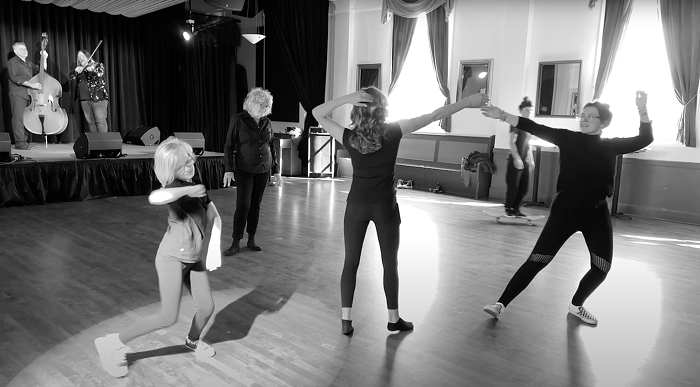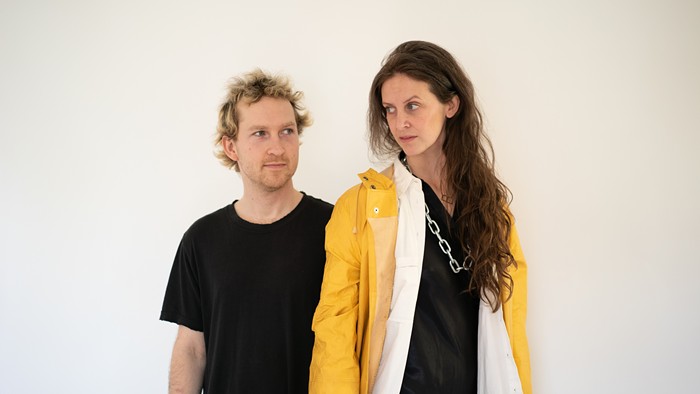THERE HAVE BEEN a few name changes: First it was Starfucker, which was fine when no one was paying attention. But once the side project of Sexton Blake's Josh Hodges got too big for guerrilla basement shows and became a proper touring band, they became the somewhat self-censoring Pyramid, then the more Google-friendly Pyramiddd. Then, mercifully, it was back to Starfucker. The new album from the Portland-originated group, Miracle Mile, bears the moniker STRFKR, and this seems a happy compromise for all, pleasing original fans and email spam filters alike.
Miracle Mile was recorded in two- to three-month chunks of writing and recording, starting in a beach house in Rockaway Beach, Oregon. The bulk of it was done in Astoria, though, where Hodges' mom's friend has a house she let him use. While it helped to get away from Portland, Hodges says it wasn't quite the idyllic extended retreat that it might seem.
"There was never a month where we didn't have a show," Hodges says, "and even though we've played the songs a bunch, it's still so much work to get ready for a show—just making sure all our equipment's ready, and packing, especially for shows that we fly into," says Hodges. "Even in Astoria, I never really had a full month where I can just work. I would have a week or two and then I'd have to do something. So there were lots of interruptions. And I would use some of the equipment that I use live to record with, so I'd have to tear down the recording setup and pack it all up. But I had some good time out there—some good alone time. But a lot of it was also spent not working on music—trying to get sane again after tour, needing a break from humans."
Hodges and his bandmates finished work on Miracle Mile in San Luis Obispo, where guitarist Patrick Morris lives. It's STRFKR's lengthiest and widest-ranging work to date—15 tracks that range from floor-stomping opener "While I'm Alive" to the ocean-wisped campfire strum of "Beach Monster." Like all good miracle miles, the album's strength is in its excellent back end, with songs like the lovely, restrained "Say to You," the Dirty Mind-era Prince-isms of "Atlantis," and the apocalypse-disco of "Leave It All Behind" exhibiting STRFKR's unfuckwithable pop sensibilities, resulting in their best material thus far.
I ask Hodges if, after three STRFKR full-lengths and an EP, he tailors his songwriting to fit the sound of the band—or if there are still songs that he sets aside for Sexton Blake. "On record, it doesn't really matter that much; I could probably do whatever I wanted," he says. "But I do like to consider the live show, because with STRFKR a big part of it is having a live show that's a fun environment, with dancing and stuff. Originally I wanted to put out an album that was all—like how some of the songs on the album are more mellow and acoustic—an album like that. But then I was like, if there's nothing on the new album that's dance-y, it's going to be really hard to play that stuff live. But I still am recording other stuff that I'll probably use with another project, if I do another Sexton Blake album or something else. I do feel like there is a certain sound that fits for STRFKR, and I'll keep songs for that, and other songs I'll keep for other projects."
Meanwhile, Hodges has felt the pull to leave his hometown of Portland, a place where family and friends provide lots of distraction. "I was in San Luis Obispo for the last three months, and I just moved to LA. I'll probably stay here for, like, a year or something," he says. "But I kind of want to live in a small town. I actually really liked Astoria.
"We still go up to San Luis Obispo to practice and that's where all my recording stuff is," Hodges continues. "It's four hours away so it's annoying to have to drive that far, but I really like it. I like being in small towns; I like how mellow and easy it is. Some things are so fucking intense about LA—the police and the parking patrols are ridiculous here. It's like a police state. I got pulled over twice for riding my bike. There are things I really like about LA, but it's weird, too."
"I think people in Portland still think of you as a Portland band," I tell him.
"Yeah, I do too," Hodges says. "That's where I'm from, and that's where we came up. [STRFKR] was cultivated out of Portland. And I still think I'll go back there. I still feel like Portland is home."



















